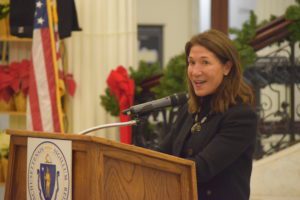Who is a member?
Our members are the local governments of Massachusetts and their elected and appointed leadership.

Lt. Gov. Polito announces $7 million in fiscal 2023 grants awarded through two Community Compact programs on Dec. 6.
On Dec. 6, outgoing Lt. Gov. Karyn Polito gathered with state and local leaders at the State House to celebrate the Baker-Polito administration’s popular Community Compact Cabinet and to announce new grants through two of its programs.
In the final weeks of the Baker-Polito administration’s eight-year run, Polito appeared at the bottom of the State House’s Grand Staircase to speak about the impact of the Community Compact on municipalities. She said that she and outgoing Gov. Charlie Baker, both former local officials, prioritized programs that promote collaboration between state and local government.
“I feel that we have institutionalized a relationship and a system of how state and local government can work and should work,” Polito said.
The Baker-Polito administration created the Community Compact Cabinet in 2015 to strengthen the state’s partnership with cities and towns, establish best practices, and encourage creative thinking about the delivery of services. The cabinet includes four programs: Best Practices, the Information Technology grant program, the Efficiency and Regionalization grant program, and the Municipal Fiber grant program.
Sean Cronin, deputy commissioner at the Division of Local Services, said the Community Compact Cabinet has awarded 1,400 grants totalling $65 million over the past eight years. He said all 351 municipalities have participated in at least one Best Practice initiative, for a total of 1,300 best practices implemented across the state.
“This is an impactful program that’s truly a win for everybody,” Cronin said.
Newton Mayor and MMA President Ruthanne Fuller described how the Community Compact program helped the city launch an on-demand rideshare program for residents, helped it complete an action plan on climate resiliency, and will allow it to convert documents into digital records. Fuller said Massachusetts is unique in its willingness to work with local officials, and in the amount of trust it places at the local level. She said that Baker and Polito’s backgrounds as municipal leaders carried over to their administration’s mindset.
“It’s no surprise that as leaders here in the Commonwealth,” Fuller said, “they have reflected in their actions their deep-seeded belief in empowering Select Board members and city councillors and town managers and city and town staff and mayors, who know what the priorities are in their local communities and also know how to make good stuff happen.”
Danvers Town Manager Steve Bartha said his community has been either the lead applicant or a sub-applicant for $750,000 worth of Community Compact grants since 2015. In particular, the Community Compact has supported the efforts of Danvers and six other North Shore communities to participate in a regional IT collaborative, “and we’re all in a better position because of it.”
Northfield Town Administrator Andrea Llamas said her rural community has received seven Community Compact grants in the past three years, for a total of about $160,000. The grants have helped to support emergency services succession planning, the hiring of consultants to work on an ambulance regionalization study, and the bolstering of the town’s computer network, which allowed the town’s systems to rebound quickly after a recent lightning strike.
“The Community Compact projects have truly helped to bridge funding gaps, and gives initiatives, gives us ideas we haven’t even thought of, more than even just the funding,” Llamas said. “It allows us to offer the best government services to our residents.”
MMA Executive Director Geoff Beckwith said the Community Compact program exemplifies government in action, allowing municipalities to respond to evolving needs — such as calls for more diversity, equity and inclusion resources after the 2020 murder of George Floyd — and the increasing cyberthreats that communities face.
“This program has helped communities act their way into a new way of thinking,” Beckwith said. “But it has also been a model for how state governments in every part of the country can take similar action to invest in their communities.”